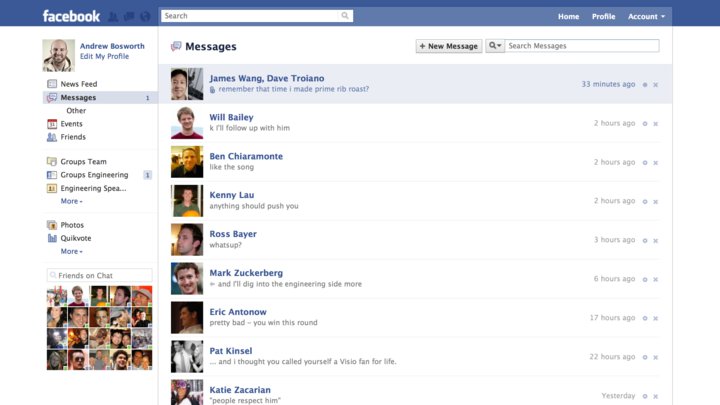All eyes were on San Francisco, California today for the rumoured announcement of Facebook's email service, dubbed "Project Titan" internally, and Fmail externally. With Facebook and email being as big as they are, what are the implications of the social giant's new product?
What's New in Messages?
Before we look into the implications, what's new in Messages?
- It combines Facebook Chat and Facebook Messages, with email.
- People can have an @facebook.com email address.
- Emails from non-friends get sent to an "Other Messages" folder.
- Attachments are now possible.
Show Me The Money
Email services typically generate high impressions from people checking and reading their emails. However, the click-through-rates are by and large quite low. This has traditionally been the case since untargetted ad banners were used for monetization.
 Gmail changed this with text ads that were contextual, based on the emails you were reading. Social Inbox, which will use the Facebook Ads platform, does not have this ability. So in terms of bringing in the green, don't look to Messages' Social Inbox as being a cash cow.
Gmail changed this with text ads that were contextual, based on the emails you were reading. Social Inbox, which will use the Facebook Ads platform, does not have this ability. So in terms of bringing in the green, don't look to Messages' Social Inbox as being a cash cow.
More importantly though, is that an integrated email service within Facebook's platform will increase the time on site. The gravitational pull users feel towards logging into Facebook will be that much greater.
Opportunities for Messages / Social Inbox
Facebook has an established base of 500 million users, of which 350 million actively use messages. In many ways, connecting and messaging friends through Facebook is much easier than email. Whose address book has all their friends' most up-to-date email addresses anyway? Having an email client that is built-in to Facebook would make it easier to stay in touch - even with people you don't contact on a regular basis.
(Click to enlarge.)
Facebook has a wealth of personal information on its users (demographics, networks, interests, events). As a result, they have the potential to deliver a more socially-connected inbox, compared to Gmail, Yahoo, or Hotmail.
Social Inbox Limitations
Will Social Inbox be a better email service than say, Google's Gmail? I doubt it - at least at first. It does not yet have IMAP capabilities, nor does it have simple features like flagging/starring. There are also no subject lines (just one long conversation), and you can't CC or BCC anyone.
Overall, Messages is lacking many features that we would come to expect from a modern-day email provider.
Facebook's inherently social nature also lends itself to more privacy concerns than Gmail.
The "Gmail Killer"?
While "_____ killer" might sound like a catchy phrase (and is thrown around far too often), I don't see the Social Inbox being the "Gmail killer". For the most part, Facebook is not a formal setting. While usage of Messages may increase between friends, I don't see it replacing email services that are geared towards productivity.
take.me.seriously@facebook.com just doesn't sound right.
Even Mark Zuckerberg said,
This is not an email killer. This is a messaging system that includes email as one part of it.
The focus here is around connecting with friends, not so much the outside world.
What's Next?
Messages and @facebook.com email addresses will be rolled out to everyone over the next few months. You can read Facebook's announcement on their blog.

